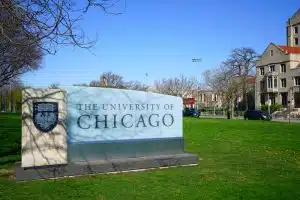When it comes to choosing the right university, there are many factors to consider. In this article, we will be comparing two of the most prestigious higher education institutions in the United States: Harvard University vs Johns Hopkins University.
We will dive deep into the history, rankings, campus life, academic programs, admissions criteria, tuition and financial aid, campus resources, career opportunities, student experience, alumni network, location, sports programs, and diversity and inclusion initiatives to help you make an informed decision about which university is the right fit for you.
The History of Harvard and Johns Hopkins: How They Came to Be
Let’s start by taking a look at the history of these two universities. Harvard was founded in 1636, making it the oldest institution of higher education in the United States. It was originally created to educate the clergy, but over time became a comprehensive university.
Johns Hopkins, on the other hand, was founded in 1876 as a research university focused on interdisciplinary studies. It was named after its founder, philanthropist Johns Hopkins. Today, both universities are world-renowned for their academic excellence and groundbreaking research.
Harvard has a long and storied history, with many notable alumni and faculty members. Eight U.S. presidents have graduated from Harvard, including John F. Kennedy and Barack Obama. The university has also produced numerous Nobel laureates, Pulitzer Prize winners, and Rhodes Scholars. In addition, Harvard has a rich tradition of athletics, with its football team dating back to 1873.
Johns Hopkins, on the other hand, has a more specialized focus on research and innovation. The university is known for its cutting-edge medical research, and its medical school is consistently ranked among the best in the world.
Johns Hopkins is also home to the Applied Physics Laboratory, which conducts research in areas such as national security, space exploration, and healthcare technology. The university has a strong commitment to public service, with many of its graduates going on to work in government, non-profit organizations, and other fields that serve the greater good.
Ranking and Reputation: How Harvard and Johns Hopkins Stack Up Against Each Other
When it comes to rankings, both Harvard and Johns Hopkins consistently appear at the top of the list of best universities in the country. According to the 2022 US News and World Report rankings, Harvard is ranked number two, while Johns Hopkins is ranked number nine.
However, it is important to note that the rankings may vary depending on which factors are being considered, and both universities have a stellar reputation in academia and beyond.
One factor that sets these two universities apart is their areas of expertise. Harvard is known for its strong programs in law, business, and the humanities, while Johns Hopkins is renowned for its medical and science programs. Both universities have produced numerous Nobel laureates and have a long history of groundbreaking research and innovation.
Additionally, both universities have a diverse student body and offer a wide range of extracurricular activities and opportunities for students to get involved in research and community service.
Campus Life: A Comprehensive Look at Student Life at Harvard vs Johns Hopkins
Harvard and Johns Hopkins offer very different campus experiences. Harvard’s campus is located in Cambridge, Massachusetts, and is known for its historic architecture and Ivy League traditions. Johns Hopkins, on the other hand, is located in the city of Baltimore, Maryland, and has a more urban feel.
Both campuses offer a variety of clubs, organizations, and activities for students to get involved in, as well as top-notch dining and residential options.
One major difference between the two campuses is the size of the student body. Harvard has a larger undergraduate population, with over 6,000 students, while Johns Hopkins has just over 5,000. This can impact the overall feel of the campus, with Harvard feeling more bustling and crowded, and Johns Hopkins feeling more intimate and close-knit.
Another notable difference is the focus on research at Johns Hopkins. The university is known for its strong emphasis on scientific research, with many students and faculty members actively engaged in cutting-edge research projects. Harvard, while also a top research institution, has a broader range of academic programs and a more diverse student body.
Academic Programs: Harvard vs Johns Hopkins
One of the most important factors to consider when choosing a university is the academic programs that are available. Both Harvard and Johns Hopkins offer a wide variety of majors and minors across a range of disciplines, with a particular emphasis on STEM fields.
At Harvard, some of the most popular majors include Economics, Computer Science, and Psychology. At Johns Hopkins, popular majors include Public Health and Biomedical Engineering. Both universities are known for their rigorous academic programs and world-class faculty.
However, there are some differences in the academic programs offered at these two universities. Harvard has a strong focus on the humanities and social sciences, with majors such as History, Government, and English being very popular. On the other hand, Johns Hopkins is known for its strong programs in the natural sciences, with majors such as Chemistry, Physics, and Biology being highly regarded.
Additionally, Johns Hopkins offers a unique major in International Studies, which combines coursework in political science, economics, and foreign languages to prepare students for careers in global affairs.
Admissions Criteria: Understanding What it Takes to Get into Harvard and Johns Hopkins
The admissions process for both Harvard and Johns Hopkins is highly competitive, with acceptance rates of less than 10% for both universities. The criteria for admission include a variety of factors, such as academic achievements, extracurricular activities, essays, and test scores.
Both universities are looking for students who are not only academically strong but also demonstrate leadership skills, intellectual curiosity, and a passion for community service.
In addition to these factors, both Harvard and Johns Hopkins also consider the applicant’s personal qualities and character. They want to see that the student has a strong work ethic, is resilient, and has a positive attitude toward challenges.
The universities also value diversity and seek to admit students from a wide range of backgrounds and experiences. It is important for applicants to showcase their unique perspectives and how they can contribute to the university community.
Tuition and Financial Aid: Comparing the Costs of Attending Harvard and Johns Hopkins
Attending either Harvard or Johns Hopkins is a significant financial investment. According to the 2021-2022 academic year, the annual tuition for Harvard is $51,925, while the annual tuition for Johns Hopkins is $53,740.
However, both universities offer generous financial aid packages to students who qualify, with Harvard committing to meeting 100% of demonstrated needs and Johns Hopkins offering need-based aid as well as merit-based scholarships. Students should carefully consider their financial situation when deciding where to attend.
In addition to tuition and financial aid, there are other costs to consider when attending either Harvard or Johns Hopkins. Both universities are located in expensive cities, with Boston and Baltimore having high costs of living. Students should factor in the cost of housing, food, transportation, and other expenses when making their decision.
Furthermore, students should also consider the academic programs and resources offered by each university. Harvard is known for its strong liberal arts education and prestigious business and law schools, while Johns Hopkins is renowned for its medical and engineering programs. Students should research the specific programs they are interested in and evaluate which university offers the best fit for their academic goals.
Campus Resources: A Look at the Libraries, Research Centers, and Other Resources Available to Students at Harvard and Johns Hopkins
Both Harvard and Johns Hopkins offer a wealth of resources to their students. The libraries at both universities are world-renowned, with extensive collections and cutting-edge research tools.
Additionally, both universities have numerous research centers and institutes focused on a wide variety of topics, from medicine to social justice. Students at both universities have access to robust career centers as well as mentorship opportunities with alumni.
Moreover, both universities have state-of-the-art technology centers that provide students with access to the latest software and hardware. These centers offer training and support to students, helping them to develop the skills they need to succeed in their academic and professional pursuits.
Additionally, both universities have well-equipped fitness centers that offer a range of activities, from yoga to weightlifting, to help students maintain a healthy lifestyle.
Furthermore, Harvard and Johns Hopkins have a vibrant student life, with numerous clubs and organizations catering to a wide range of interests. These clubs provide students with opportunities to meet like-minded individuals, develop leadership skills, and engage in extracurricular activities that complement their academic pursuits. Both universities also have active student governments that represent the student body and advocate for their needs and interests.
Career Opportunities: How a Degree from Harvard or Johns Hopkins Can Propel Your Career Forward
Graduating from either Harvard or Johns Hopkins opens up a wide range of career opportunities. Both universities are known for producing successful and influential alumni across a range of industries, from politics to finance. Additionally, both universities offer extensive career services to students, including career counseling, job fairs, and networking opportunities.
One of the key advantages of attending Harvard or Johns Hopkins is the prestige associated with these institutions. Employers often view graduates from these universities as highly qualified and capable individuals, which can give them a competitive edge in the job market.
Furthermore, the rigorous academic programs at both universities prepare students for the challenges of the workforce, equipping them with the skills and knowledge necessary to succeed in their chosen fields.
Another benefit of attending Harvard or Johns Hopkins is the opportunity to connect with a diverse and talented group of peers. Both universities attract students from all over the world, creating a vibrant and dynamic community of learners. This diverse network can be invaluable when it comes to building professional relationships and expanding one’s career opportunities.
Student Experience: Insights from Students Who Attend or have Attended Harvard or Johns Hopkins
One of the best ways to get a sense of what it’s like to attend a particular university is to hear from students who have already gone through the experience.
Students at both Harvard and Johns Hopkins report a challenging but rewarding academic experience, with opportunities to get involved in clubs, research, and community service. However, some students report feeling isolated or overwhelmed by the competitive environment at both universities.
Despite the competitive environment, many students at Harvard and Johns Hopkins report feeling supported by their peers and faculty. Both universities offer extensive resources for academic and personal support, including tutoring, counseling, and mentorship programs.
Additionally, students at both universities have access to world-class facilities and research opportunities, which can be a major draw for those interested in pursuing careers in science, technology, engineering, or math.
Another aspect of the student experience at Harvard and Johns Hopkins is the vibrant social scene. Both universities are located in cities with rich cultural offerings, and students have access to a wide range of extracurricular activities, from sports and music to theater and community service.
Many students report forming lifelong friendships and professional connections through their involvement in these activities, which can be a major benefit long after graduation.
Alumni Network: Harvard vs Johns Hopkins
One of the most valuable resources that both Harvard and Johns Hopkins offer is their alumni network. Graduates of both universities have gone on to achieve great success in a wide range of fields, and being part of this network can be a valuable asset for job placement, mentorship, and networking opportunities.
Additionally, both Harvard and Johns Hopkins have active alumni associations that offer a variety of events and programs for graduates to stay connected and engaged with their alma mater. These associations often host networking events, career fairs, and professional development workshops, providing even more opportunities for alumni to connect with each other and with current students.
Location, Location, Location: Comparing the Cities of Cambridge (Harvard) and Baltimore (Johns Hopkins)
The location of a university can have a big impact on the overall student experience. Harvard’s campus is located in the historic city of Cambridge, just across the river from Boston, and offers a wide range of cultural and recreational activities.
Johns Hopkins is located in the bustling city of Baltimore, known for its vibrant arts scene and thriving food culture. Students should consider what type of environment they prefer when deciding which university to attend.
Additionally, both cities have unique opportunities for students interested in internships and job prospects. Cambridge is home to many biotech and tech companies, providing students with access to cutting-edge research and job opportunities. Baltimore, on the other hand, has a strong healthcare industry, with Johns Hopkins Hospital being a major employer in the area. Students interested in healthcare or related fields may find more opportunities in Baltimore.
Sports Programs: Harvard vs Johns Hopkins
Both Harvard and Johns Hopkins offer a range of athletics programs, from varsity sports to club teams and intramural leagues. Harvard is part of the Ivy League Conference, and its varsity teams have a strong tradition of excellence in sports such as football, basketball, and rowing. Johns Hopkins is part of the NCAA Division III and has a storied history in sports such as lacrosse and tennis.
In addition to the traditional sports programs, both Harvard and Johns Hopkins also offer unique opportunities for students to get involved in less common sports. Harvard has a strong fencing program, as well as a successful sailing team. Johns Hopkins offers a competitive squash program, as well as a thriving ultimate frisbee club. These programs allow students to explore new sports and find a community of like-minded individuals who share their interests.
Diversity and Inclusion: Harvard vs Johns Hopkins
Finally, it is important to consider the diversity and inclusion initiatives at both universities. Both Harvard and Johns Hopkins have made efforts to increase diversity and equity on their campuses, but there is still work to be done. Students should consider how important a diverse and inclusive student body is to them when making their decision.
In conclusion, both Harvard and Johns Hopkins are excellent universities that offer a wealth of opportunities to their students. The decision of which university to attend ultimately comes down to personal preference and fit. By considering the factors discussed in this article and conducting further research, students can make an informed decision about which university is the right fit for them.
At Harvard, the Office for Diversity, Inclusion, and Belonging is dedicated to promoting diversity and inclusion across the university. The office offers a range of programs and initiatives, including training sessions for faculty and staff, diversity and inclusion workshops for students, and support for student-led diversity initiatives.
Additionally, Harvard has a number of student organizations dedicated to promoting diversity and inclusion, such as the Black Students Association and the Asian American Association.
Similarly, Johns Hopkins has a number of initiatives aimed at promoting diversity and inclusion on campus. The Office of Diversity and Inclusion offers a range of programs and services, including diversity training for faculty and staff, support for student-led diversity initiatives, and resources for underrepresented minority students.
Additionally, Johns Hopkins has a number of student organizations dedicated to promoting diversity and inclusion, such as the Black Student Union and the LGBTQ+ Alliance.
If you’re set on getting into a world-class college but aren’t sure how to make it happen, we can help! AdmissionSight is a leading college entrance expert with over a decade of experience helping students just like you get into the schools of their dreams.
At AdmissionSight, we focus on offering a wide range of services, all aimed at helping students perfect their applications to catch the attention of admissions officers. Contact us today to schedule a free consultation and learn more about what we offer.










































